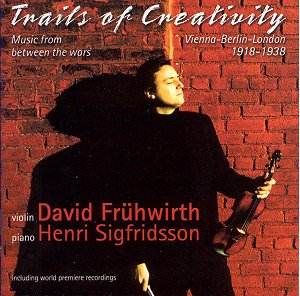This is a concept album in which linkages
of friendship between Gál, Rathaus, Busch, Frenkel,
Wellesz and Weill are emphasised. Others do not quite fit but
their music is of the same era and often of a similar style
give or take a shading here and there. Gál's Sonata
is in three movements. The lightly Brahmsian first and final
movements are intimate dialogues suggesting friends just as
much at ease in mutual silence as in conversation. The scherzo
sings kindly in its own central section separating two ripplingly
active motoric sections of skittering fairytale enchantment.
This is a lovely discovery and must make us eager to hear his
1920 Violin Sonata (No. 1).
I have written about Rathaus before. His orchestral
music is on a Centaur anthology (reviewed elsewhere on this
site). This Suite proclaims a scathing independence from Brahmsian
heritage. The work is characterised by Schoenbergian skills,
Bartókian drive and the humour of the graveyard. The
work is dedicated to Stefan Frenkel. Rathaus was born in Galicia,
lived in Berlin but seeing the writing on the wall he left
for Paris in 1932 and thence to London and the USA where he
died in 1954.
Another gear-change takes us to Sammons' arrangement
of Rosse's theatre music for a 1905 production of The Merchant
of Venice. This is light music, sweet-toned, poetic, sentimental,
akin to early Delius with a helping of Schumann along the way
in the two marches (Oriental and Doge's). The
predominant slower music is much more effective than the marches.
Toscha Seidel and Mischa Elman among many
others played Korngold's suite (the third suite on CD1) for
its sunset sentiment (at its giddy peak in Garden Scene)
and its dense romance. The Hornpipe sounds fake-antique;
the sort of thing Respighi did in Gli Uccelli.
The Gál, Rathaus, Rosse, Walton, Busch,
Wellesz and Gurney (the scherzo) are all premiere recordings.
The substantial Walton Toccata comes
from the formative period of the early 1920s. A reference work
of that time lists Walton's pedagogic overture Doctor Syntax (whatever
happened to that?) as well as The Passionate Shepherd for
tenor and small orchestra. The stocky and unpredictably taciturn Toccata is
a work in which Bartók's Allegro Barbaro style
is threaded through with the luxuriance of Szymanowski and
the complexity of expressionistic early Schoenberg. This is
not at all what you may have been expecting and is an example
of the road Walton did not pursue. After this the slightly
updated Mozartianisms of the Busch suite, while well crafted
and full of easy charm, seem almost too facile - the exception
being the lovely Andante Cantabile which proclaims its
blood relationship with the Gál suite. This continues
into the introduction to the finale but then sinks back into
conventionality - albeit very polished. The Wellesz casts off
such smooth accomplishment and bears to the Busch the same
relationship as the Gál does to the Rathaus except that
the dissonance of the Wellesz is rooted in Bach's sonatas and
partitas rather than the wilder territories of the Second Viennese
school. In the second of the two movements Wellesz touches
on the sort of sinister gawky ghoul dances beloved of Shostakovich.
Of course popular culture, the tango, sleazy macabre and knowing
romance are very much the currency of Weill in Frenkel's reduction
of the Seven Pieces from The Threepenny Opera. Frühwirth
relishes the famous ballad but also makes hay with Polly's
Song.
The Hogarthian mean-spirited life of the Weill
opera contrasts most startlingly with the two Gurney pieces.
These have in common only the madness of Gurney pushed beyond
tolerance by the Great War. When he wrote these two sketches
he was only three years away from being certified. The music
is gentle without being genteel. The Scherzo is a delicate
early Beethovenian dance with a slight Scottish flavour. The
Apple Orchard is much closer to the accustomed pastoralism
represented by Howells, Butterworth's A Shropshire Lad and
Bridge's Summer.
Such a pity that there was no room for Joseph
Holbrooke’s Third Violin Sonata Orientale. It would
have fitted perfectly in the lyrical facet of this company.
Admirable artistic and technical values throughout.
I hope for further refreshingly original themed collections
along these lines.
Rob Barnett
FURTHER INFORMATION
www.davidviolin.com
See
also review by John Leeman




